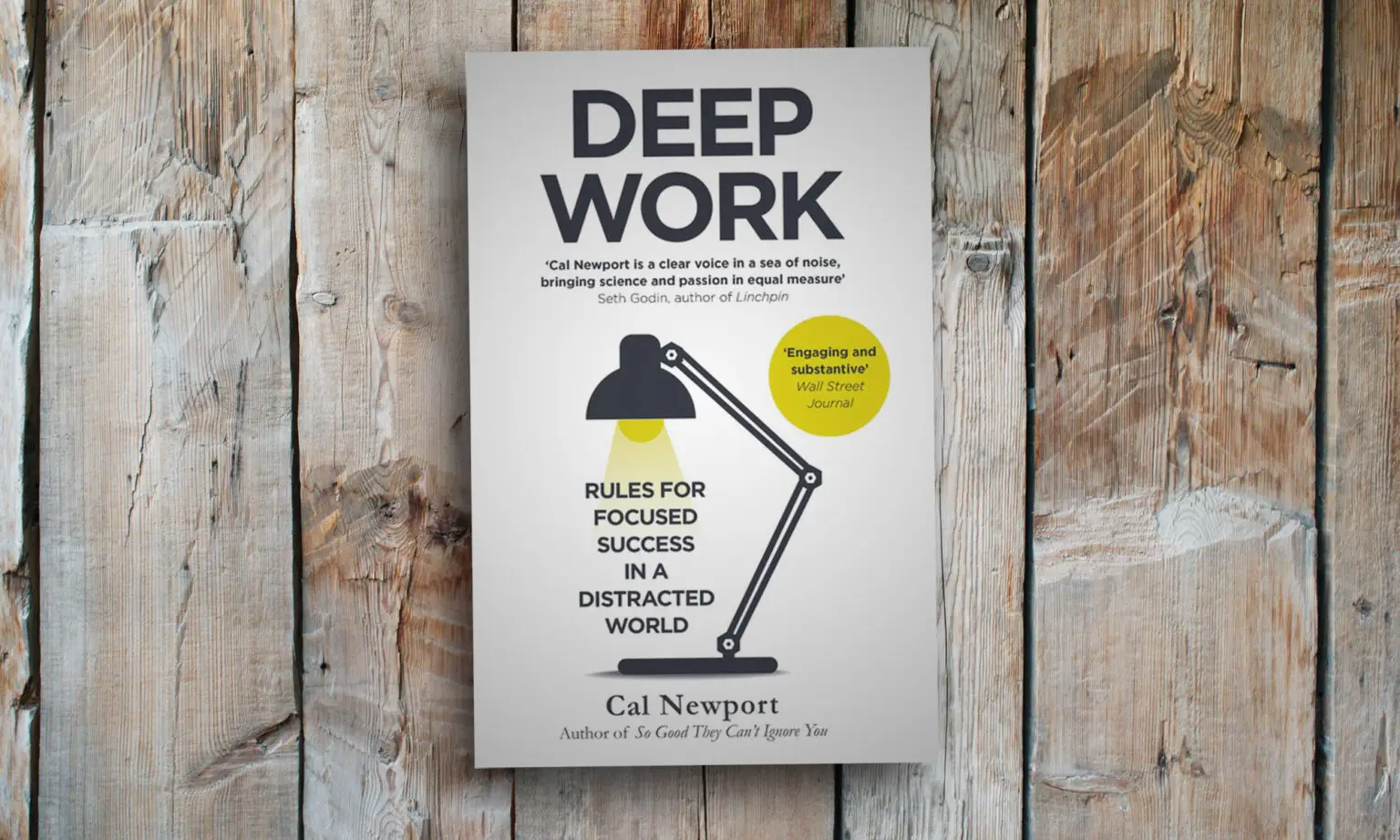Overview: In Deep Work: Rules for Focused Success in a Distracted World, Cal Newport argues that the ability to focus deeply on cognitively demanding tasks is increasingly rare yet crucial in today’s economy. Newport distinguishes between “deep work,” which is focused, distraction-free, and produces meaningful results, and “shallow work,” which is low-value, logistical, or superficial tasks. The book explains why cultivating deep work is essential and provides actionable strategies for mastering it.
Key Ideas:
Deep Work vs. Shallow Work:
- Deep Work leads to high-value outcomes and personal fulfillment.
- Shallow Work is non-cognitively demanding and often a result of distractions.
- The Four Rules for Deep Work:
- Work Deeply: Systematically eliminate distractions to focus better.
- Embrace Boredom: Train your mind to resist instant gratification.
- Quit Social Media: Evaluate the tools you use and eliminate those that don’t provide substantial value.
- Drain the Shallows: Minimize shallow work and free time for deeper efforts.
The Importance of Deep Work:
- Increases productivity, learning ability, and creativity.
- It helps individuals stand out in an economy driven by knowledge work.

Part 1: The Idea
Chapter 1: Deep Work is Valuable
Newport explains how the economy increasingly rewards individuals who can master complex tasks quickly and produce high-quality work. Deep work is critical for excelling in this environment because it enhances learning and productivity. Examples include Carl Jung, who retreated to a tower to work deeply, and modern professionals who achieve breakthroughs through focused effort.
Chapter 2: Deep Work is Rare
Modern workplaces and digital technologies promote distraction. Open offices, endless emails, and social media prioritize constant responsiveness over depth, leading to an environment where deep work is undervalued. Newport highlights the cost of this cultural shift, emphasizing that shallow work rarely leads to meaningful achievements.
Chapter 3: Deep Work is Meaningful
Deep work is not only professionally rewarding but also deeply fulfilling. Engaging in deep work creates a sense of purpose and satisfaction. Drawing on psychological research, Newport argues that humans find happiness in activities that challenge their abilities, which deep work inherently provides.
Part 2: The Rules
Rule 1: Work Deeply
Newport offers practical advice for cultivating deep work habits. This includes creating rituals, setting specific goals for deep work sessions, and eliminating distractions. Strategies like the “monastic,” “bimodal,” “rhythmic,” and “journalistic” approaches to deep work are introduced, allowing readers to tailor their practices to their circumstances.
Rule 2: Embrace Boredom
To focus deeply, one must train their mind to resist distractions. Newport suggests scheduling internet use, taking breaks from connectivity, and practicing mindfulness. Embracing boredom helps strengthen the ability to concentrate.
Rule 3: Quit Social Media
Social media often provides little value while significantly increasing distractions. Newport advises conducting a “Craftsman Approach to Tool Selection,” where you evaluate whether a tool adds enough benefit to your personal or professional life to justify its costs.
Rule 4: Drain the Shallows
Minimizing shallow work is essential to prioritize deep work. Newport recommends tracking how time is spent, saying “no” to unimportant tasks, and setting clear boundaries around work hours. He emphasizes the importance of protecting time for focus and meaningful work.
Actions and Steps to Follow
1. Define Your Deep Work Philosophy
Choose a strategy that aligns with your lifestyle:
- Monastic: Eliminate shallow work entirely.
- Bimodal: Divide your time between deep work and other responsibilities.
- Rhythmic: Establish consistent daily routines for deep work.
- Journalistic: Fit deep work into your schedule whenever possible.
2. Create a Deep Work Ritual
- Set a specific location for deep work.
- Define start and end times for each session.
- Prepare tools and eliminate potential distractions before starting.
3. Schedule Distraction-Free Time
- Block out time for deep work in your calendar.
- Set rules for when and how you’ll use the internet or check email.
- Practice mindfulness to improve focus.
4. Limit Social Media
- Conduct a 30-day digital detox.
- Reintroduce tools only if they provide substantial value.
- Turn off notifications and use apps sparingly.
5. Track Your Time and Progress
- Keep a journal of your work hours.
- Identify how much time is spent on shallow vs. deep tasks.
- Set weekly goals for deep work hours.
6. Prioritize Important Tasks
- Use the Eisenhower Matrix to focus on urgent and important tasks.
- Say “no” to meetings, tasks, or commitments that don’t align with your goals.
7. Cultivate a Deep Work Mindset
- Reflect on the purpose and value of deep work in your life.
- Regularly revisit your goals and achievements to stay motivated.
- Seek environments and communities that encourage focus and depth.
